Inspiration in the Field: Miyagi Prefecture, Matsushima Bay - The Bay of Memories and Healers
- Jeff Fuchs
- Nov 30, 2022
- 3 min read

Few places on this recent journey conjured up so much raw feeling as Miyagi Prefecture did, and Matsushima Bay in particular. It was an area devastated by the 3/11 tsunami, which made it an infamous land of sorrows.
First impressions coupled with the fact that our host and old friend, Miku, had her own stories of the deadly time when seawater plowed its way inland destroying life and leaving an unwanted legacy in this eastern seaboard, made this whole arrival something compelling. With such spaces though, there are inevitably personalities and deeds of inspiration.
Our journey here was to immerse into as much as we could, and into some of what had fed the revival of the people and the place. Organizations and individuals, who, in their own ways formally and informally provided services, presence, and simply found ways (any ways) to support and restore.

Miku was perhaps the perfect conduit to this space, having spent most of her life here. She empathized and saw first-hand how the trials of reconstructing a society - and the trust within – needed heaps of time and intention. Miku also had that rare quality of letting people and spaces speak and communicate in their own way and at their own speed.
What we found wasn’t so much a place of dread and dwelling on any past but rather a place of awareness, and some of the famed grit that local farmers and fishermen have long embodied. Miku had spoken about it and now we were amidst it.
A few precious characters with tales, inspiration, and simple deeds came happily into our orbit and though needing far more space than the below suggests, they are hugely vital mentions and sources not just for ourselves, but we think, for all.
Harunobu and Eiko Togawa

Sabusawa Island, Matsushima Bay
These gems of humans perhaps perfectly (but informally) sum up much of the region’s ability and struggles. An elderly couple who both fish and farm from their home on Sabusawa island, they encourage people to join them in harvesting rice, oyster gathering, or simply help harvest the local seaweed directly from the sea, so that others might “understand by doing” the struggles and joys of living off of the land and sea…and from the seasons. It was in Harunobu-san’s words that the essence of his belief of learning and recovery was made clear: “There is nothing more important than getting on with life. Experience and putting your hands on something helps you understand what needs to be done”.

Futoshi-san
Matshushima Bay
One of the most famous makers of nori (dried seaweed) and someone renowned for his attention to craft, Futoshi-san now splits his time between his business and that of what he calls the “most” important aspect of his life: speaking to children, legislators, and friends alike about food security and the effects of the climate upon food stocks. Over a meal of sushi, the quietly intense Futoshi-san, repeats again and again the absolute need to “prepare our youth to think, to plan, and be responsible for their environment”.
Ken and Yukiko Hachimura

Dedicated to getting youth groups outside of walls to work and engage with horses at their little ranch of rolling green hills, the couple lives their intentions. “Just as we have learned to domesticate animals, they still have the ability to heal us”, Ken reminds. “Horsepower” is Ken’s key word and for him it encapsulates the old wisdom that life supports life and that all of the healing and teaching ‘tools’ are available and close at hand. Ken and Yukiko’s belief is that working (and simply being) with animals offers a kind of tonic and restorative balance to life.

Yabe-san
Shiogama
Tea master entertainer, psychologist, and most vitally a healer, Yabe-san has long used his tea and tales to aid in the reestablishment of values. In the coastal city of Shiogama, tea leaves are his business and his tools to bring people together for his own very special brand of socialization. He reiterates what we’ve heard so many times upon this journey: “Experiential anything – be it taste, work, conversation – helps us all feel whole again”.
Each of the characters and experiences above could easily warrant an entire written tale, and it doesn’t do them nearly enough justice, but it does hint that some of what ‘heals’ is almost identical to that which is simply good for society, for youth, and for experiential learning: engagement and acknowledgement.
We take these little lessons and inspirations to heart as we continue to learn and expand our little vision of what is possible.











Comments